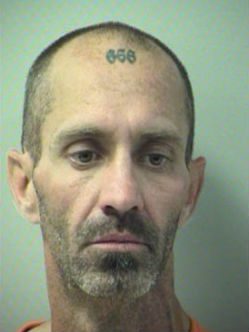Let’s commend the off-duty Okaloosa County deputy who detained an apparently drunken man with a “666” tattoo on his forehead after the guy allegedly disrupted a Florida church service on Sunday. The suspect, Michael W. Holman, was reportedly “belligerent and using profanities.” Police say Holman “repeatedly refused to remove his hands from his pockets” and “told the deputy ‘he would take his firearm and kill him with it,'” but he was still restrained and arrested without lethal violence. That’s how police work is supposed to be done.

For those keeping score at home, if you’re white, you can apparently refuse to take your hands out of your pockets and threaten to kill a cop while sporting a tattoo of the Number of the Beast on your forehead. But Freddie Gray is dead because he “made eye contact” with a police officer.
This is what white privilege looks like.
That term — “white privilege” — still confuses many people, though, provoking a defensive response on their part. And this stark example of white privilege in action shows why they’re confused. After all, the “privilege” in question here is more of a basic human right — the right not to be summarily executed for the misdemeanor of “disorderly intoxication” or even for the alleged felony of “corruption by threat to a public servant.”
Not getting gunned down by police doesn’t really seem like a “privilege” — more like a bare-minimum starting point for basic freedom and dignity. And that’s true of a great deal of what we mean when we talk about “white privilege.” It refers to the basic, bare-minimum rights of freedom and dignity that everyone ought to be able to take for granted.
The point of discussing “white privilege” is not to say that white people should be denied such basic, bare-minimum rights. The point is to say that everyone else should enjoy them too.
The peaceful arrest of someone like Michael Holman highlights the inconsistency of American law enforcement — it’s inequality, unfairness and injustice. But it is only the crudest, most curdled imagination that thinks the only way to correct such inconsistency would be for police to gun down people like Holman the way they gun down unarmed black citizens every day. That would make the system consistent and equal, but still unfair and unjust.
No, the point is not that Holman should have been been shot to death like Amadou Diallo was, but rather that Diallo should still be alive like Holman is. The point is not that the white privilege of basic dignity and basic rights should be taken away from white people, but that it should not be a privilege restricted only to white people — it should be extended to everyone.
That’s not only a matter of basic justice for everyone else, it’s also a matter of basic justice for white people themselves. Because until that happens, the basic human rights that white Americans can mostly take for granted are not rights at all — merely privileges. And the difference between rights and privileges is that privileges can be rescinded at any time, for any reason, by those in power.
As for poor Michael Holman, here’s hoping his public defender is able to persuade the court to direct him toward the kind of help it seems he needs. Maybe that off-duty deputy and his fellow parishioners at First Assembly of God can help him to find a bit of the grace that Kris Kristofferson hints at here:












